In Translation...
 A while back, on one of the Facebook groups I belong to, the question was raised about translating LGBTQ fiction into other languages. A hot topic for many. Once my response got to be over 1000 words, I knew I had a blog post on my hands, so here it is.
A while back, on one of the Facebook groups I belong to, the question was raised about translating LGBTQ fiction into other languages. A hot topic for many. Once my response got to be over 1000 words, I knew I had a blog post on my hands, so here it is.Would I love my books translated into other languages so readers could enjoy more stories in their own native tongue? Yes. It would be great to spread LGBTQ fiction (and SF & F LGBTQ) further.
The biggest problem for independent US pubs is cost, and honestly, that will always be a deciding factor no matter how much someone wants to bring their books to a larger market.
CAN WE AFFORD TO DO THIS?
Will they make money, break even, or have a deficit if they choose to translate it? Depends on how well the author has sold and if large enough population outside the US pushes for it. If the company can't make the money back then that puts their US business in peril.
What kind of market can they take hold of to be able to promote the book? Most of the LGBT indie companies we work with/write for are established here in the US, and don't have a way to market the way we can here. Are there LGBTQ indie pubs overseas? Yes, but that's another topic. The freedom we have to write/publish here versus overseas is a different experience.
Will they be able to find a person who can translate well? I've seen translations from presses who have been ripped apart because the native speakers found faults in the translations.
I could go on, but that won't allow me to stipulate on some of the things I've seen/thought about.
I have seen arguments between English language authors and foreign language readers about pirated translations get horrid pretty fast, and I don't want to spend too much time on that but it does need to be part of the discussion - without the vitriol. Also, geography is important. To put it in perspective I want to use two genres as an example that are not English LGBT fiction: Scandinavian Mysteries & Yaoi (Japanese Boys' Love manga).
Would I love my books translated into other languages so readers could enjoy more stories in their own native tongue? Yes. It would be great to spread LGBTQ fiction (and SF & F LGBTQ) further. The US is huge, with a lot of people, 330 million. All of Europe has about 742 million combined. We have a lot of people to create works for us, some of which aren't English, but the vast majority of books published here for the casual reader are in English. Now, the difference here, even though we have a smaller population is that the populace - until more recently - only needed to speak one language while Europeans are used to being multilingual. My brother in law speaks four languages regularly. Me? One. Take a look at the maps below to get an idea of what i'm talking about. They're not perfect, but I think the point is clear. Take a look of the one with Texas - our second largest state. How many different languages and cultures are shown in just that state?
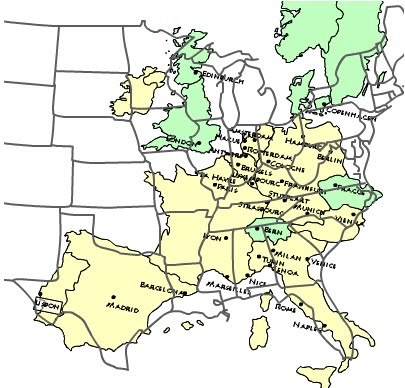 Europe superimposed over Eastern US.
Europe superimposed over Eastern US.  Texas superimposed over Europe. Our societies have been structured differently from the get go. We drive two medium size states over, they're still speaking English. Travel the same distance in Europe and you have the possibility of encountering four, five, or six different languages depending on the direction. The average American will never have that experience. In Europe, being multilingual is a necessity and how business is done. If a book sells really well in one country, the others notice and approach that publishing house, work out a deal and get it translated as a course of business, but those are the best sellers on their lists. Some of the medium sized sellers may too, because they are used to this and have a business model to work with.
Texas superimposed over Europe. Our societies have been structured differently from the get go. We drive two medium size states over, they're still speaking English. Travel the same distance in Europe and you have the possibility of encountering four, five, or six different languages depending on the direction. The average American will never have that experience. In Europe, being multilingual is a necessity and how business is done. If a book sells really well in one country, the others notice and approach that publishing house, work out a deal and get it translated as a course of business, but those are the best sellers on their lists. Some of the medium sized sellers may too, because they are used to this and have a business model to work with.In the US, there are thousands of books published in English every week. A tiny fraction of those will only ever see translations in a foreign language. Only the big best sellers are approached — Stephen King is a perfect example — by publishing houses in foreign countries for the rights to translate and publish. It's not automatic and LGBT writers aren't discriminating against non-English speakers. We're writing in our own language and have not been approached by LGBTQ pubs in Europe to work out deals like the traditional model.
What about Scandinavian Mysteries? How does that apply? This applies to my geography issue, and the observations here are qualitative.
Stieg Larsson's The Girl With The Dragon Tattoo (aka Men Who Hate Women) got rave reviews and was out long before it ever got a US English translation. My dad ordered the UK version of it a year before it came out here. What does this tell us? It tells us translation is not a given. Mysteries were considered 'dead' in some sense here in the US and here comes this Scandinavian writer that changes everything. If his book hadn't sold as well as it did in Sweden, then it wouldn't have been translated for everyone else. US publishers wouldn't have noticed the sales in the UK and they never would have approached him/his representatives for the rights to publish here. Larsson had this awesome and different book with a strong bisexual female protagonist, and it changed things. He not only reinvigorated the US Mystery market, but he put Scandinavian mystery writers on the map.
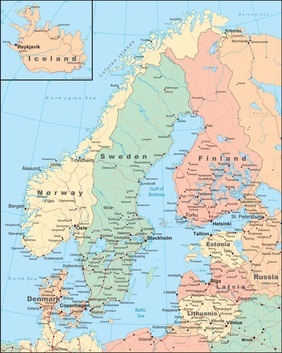 Sweden is about 450,000 square miles with a population of just under 9.6 million.
Sweden is about 450,000 square miles with a population of just under 9.6 million.  The Chicago metro area (in red) is almost 11,000 square miles, and a population of just over 9.6 million. Look at who is being brought over from Europe to the US—it's still the Scandinavian mystery writers they're bringing over, not the best French or German or Italian mystery writers - but more like Larsson. They found a spot to mine and that's what they're digging at until it dries up. Are there fantastic German/Spanish mysteries English readers are missing out on? Hell yeah, but we don't know because they aren't being pursued by publishers here. We also have a highly competitive market in our own language. Think about it. The size of the Chicago metro area (where I live) has almost the same population of all of Sweden. City vs Country. Think about it. Are those mystery readers pirating/translating the mysteries because they can't get them here? More often than not, no, no they aren't. Some are, there is always a small fraction of any population that will do so.
The Chicago metro area (in red) is almost 11,000 square miles, and a population of just over 9.6 million. Look at who is being brought over from Europe to the US—it's still the Scandinavian mystery writers they're bringing over, not the best French or German or Italian mystery writers - but more like Larsson. They found a spot to mine and that's what they're digging at until it dries up. Are there fantastic German/Spanish mysteries English readers are missing out on? Hell yeah, but we don't know because they aren't being pursued by publishers here. We also have a highly competitive market in our own language. Think about it. The size of the Chicago metro area (where I live) has almost the same population of all of Sweden. City vs Country. Think about it. Are those mystery readers pirating/translating the mysteries because they can't get them here? More often than not, no, no they aren't. Some are, there is always a small fraction of any population that will do so.What this shows us that exclusion isn't on purpose. It can be hard to feel that, though, especially when you've been excluded for being who you are every day on some level.
LGBTQ writers here in the US aren't purposefully keeping their materials away from other LGBTQ readers. But for people who are often excluded or are harassed or discriminated against I can see why it would feel that way. We don't have the network and resources built in like the traditional publishing houses do, and that's part of the growing pains, but more on that in a bit.
Growing pains and exclusion actually leads me to Yaoi - for simplicity sake, the Japanese manga version of MM Romance. There's also the tamed down version of it called shounen-ai. Just like MM it has varying degrees of heat and explicitness. Just like MM it hit big, huge in fact, in the market. Anime and manga were being imported from Japan to the US with increasing amounts, and Yaoi was among the products doing well. For a while.
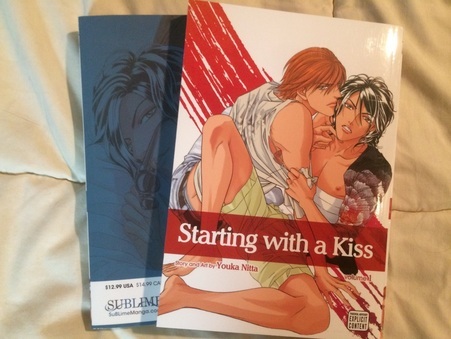 SuBlime is a newer publisher in the game, slowly acquiring and rescuing titles. If you were at Yaoi-con this year they announced a couple new titles. Their eBook versions of their titles is the best that I've seen down in the industry.
SuBlime is a newer publisher in the game, slowly acquiring and rescuing titles. If you were at Yaoi-con this year they announced a couple new titles. Their eBook versions of their titles is the best that I've seen down in the industry. 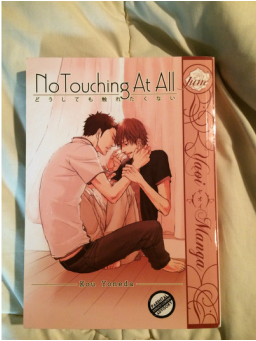 June is still publishing Yaoi but at a greatly reduced number. There were a few things that changed the landscape of importing manga and anime in the late 1990s and early 2000s. The internet being one of them, and a younger, savvier internet generation. Social media platforms made another huge impact. The way people could share information and their likes changed, and as that happened, so did another thing. Attitude. That one caused a lot of changes in the publishing landscape on many different ends-the authors, the consumers, the Japanese publishers, and the American publishers.
June is still publishing Yaoi but at a greatly reduced number. There were a few things that changed the landscape of importing manga and anime in the late 1990s and early 2000s. The internet being one of them, and a younger, savvier internet generation. Social media platforms made another huge impact. The way people could share information and their likes changed, and as that happened, so did another thing. Attitude. That one caused a lot of changes in the publishing landscape on many different ends-the authors, the consumers, the Japanese publishers, and the American publishers.Yaoi has been around for a while, and was the big thing (in my mind) before MM Romance. It rose up in the 1970s in Japan and by the 1990s was often called Boys' Love, or BL. Its roots were in the Japanese dojinshi that parodied popular shonen (Boy's) manga and anime. What may have surprised some (but not others) was its staying power. In the 1990s, several companies were bringing over any (and really, I do mean any) anime and manga from Japan. We became a viable market for them and they started handing out their rights, signing big deals with lots of companies. Little, smaller operations popped up, wanting to bring over their favorites but not seeing the bigger names doing so. All sorts of genres fell into this. Popular anime and manga in Japan weren't necessarily what hit over here so it was a learning curve for everyone. And for a while, paradise. You could find anything you wanted.
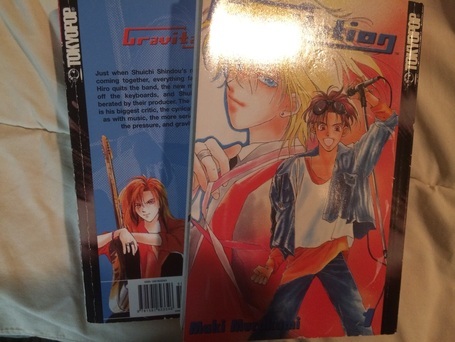 If you're wondering about the "dated" look of Gravitation, that's because this manga was started in 1996. TokyoPop (now defunct in the US - the international arm is still going) brought it over during our Yaoi/Shounen-ai boom. People ate up anime and manga like no tomorrow. Lots of stuff got brought over, Yaoi being one of those things. And guess what? It was a huge hit, especially with female readers. Sound familiar? For a while dozens of Yaoi were being published a month, more on the way all the time. And then it all started to stop, slowly, bit by bit. The cash flow ebbed and all sorts of things got blamed. People had the demand, they wanted this anime and manga, so why was it too expensive to do any more?
If you're wondering about the "dated" look of Gravitation, that's because this manga was started in 1996. TokyoPop (now defunct in the US - the international arm is still going) brought it over during our Yaoi/Shounen-ai boom. People ate up anime and manga like no tomorrow. Lots of stuff got brought over, Yaoi being one of those things. And guess what? It was a huge hit, especially with female readers. Sound familiar? For a while dozens of Yaoi were being published a month, more on the way all the time. And then it all started to stop, slowly, bit by bit. The cash flow ebbed and all sorts of things got blamed. People had the demand, they wanted this anime and manga, so why was it too expensive to do any more?What changed was the landscape.
We went from VHS tapes and paperbacks to DVDs and PDFs. On the internet, you could find anything, do anything, SHARE anything with anyone you wanted. The response was immediate. Hey, you want to know what happened in the next episode? Guess what, I translated it for you and uploaded to this server. Check it out.
 Geneon brought over some really fun stuff and a huge variety of anime. They were one of the companies that went belly up here in the states. One of their titles was Kyo Kara Maoh!, a shounen-ai. It was actually a very popular anime in Japan. It's still ongoing as a manga and light novels. The anime also has a PlayStation 2 game. It ran for 117 episodes with 5 OVAs, and was even made into a musical. Here is the US, we have two seasons. When Geneon closed their doors in 2007, Funimation finished off the second season (78 episodes) for them and then let it drop (it's license expired in 2011). Now, Kyo Kara Maoh! had its issues, but this was an overall positive role model for LGBT youth that we lost. The industry 'couldn't' meet fan demand. So, the fans took it into their own hands. They'd get pirated copies of shows or manga, do their own translation, and upload it to share. Who were they hurting? Those companies made a ton of money, right? Besides, they were too slow in getting the really good stuff out there. They had no taste. The fans could do it better than the paid translators anyway. Another problem? The readers were mostly teens and young adults – women — who didn't have the means to buy the translations. Not an uncommon problem LGBTQ youth have in today's market. (It is hard to buy the materials when you're afraid who might find them or have the means - job, credit card - to buy them legally and have to ask mom and dad to buy them when you're still trying to figure it out.)
Geneon brought over some really fun stuff and a huge variety of anime. They were one of the companies that went belly up here in the states. One of their titles was Kyo Kara Maoh!, a shounen-ai. It was actually a very popular anime in Japan. It's still ongoing as a manga and light novels. The anime also has a PlayStation 2 game. It ran for 117 episodes with 5 OVAs, and was even made into a musical. Here is the US, we have two seasons. When Geneon closed their doors in 2007, Funimation finished off the second season (78 episodes) for them and then let it drop (it's license expired in 2011). Now, Kyo Kara Maoh! had its issues, but this was an overall positive role model for LGBT youth that we lost. The industry 'couldn't' meet fan demand. So, the fans took it into their own hands. They'd get pirated copies of shows or manga, do their own translation, and upload it to share. Who were they hurting? Those companies made a ton of money, right? Besides, they were too slow in getting the really good stuff out there. They had no taste. The fans could do it better than the paid translators anyway. Another problem? The readers were mostly teens and young adults – women — who didn't have the means to buy the translations. Not an uncommon problem LGBTQ youth have in today's market. (It is hard to buy the materials when you're afraid who might find them or have the means - job, credit card - to buy them legally and have to ask mom and dad to buy them when you're still trying to figure it out.)All sorts of explanations went flying. But what was happening is this: American companies invested in the Japanese manga and anime, but they no longer had buyers to give it to. Oh, now don't get me wrong, I have several bookshelves I can show you proving some of us bought, that many did. But with the illegal shares online (and some bad business decisions - no one thing can be blamed, but some shoulder it more), people stopped buying. They traded. So the companies who spent tens of thousands of dollars to put anime and manga out there weren't seeing revenues. Fans would refuse to take stuff down. Litigation happened, draining resources, and a sense of the right to share infused a certain portion of the fan base.
The result?
Less anime, less manga, and as a result less Yaoi. Publishers closed their doors because they couldn't afford to stay open and fight to get the translations down and not make money, as did companies of anime distribution. You want to tell me illegal translations didn't affect the market?
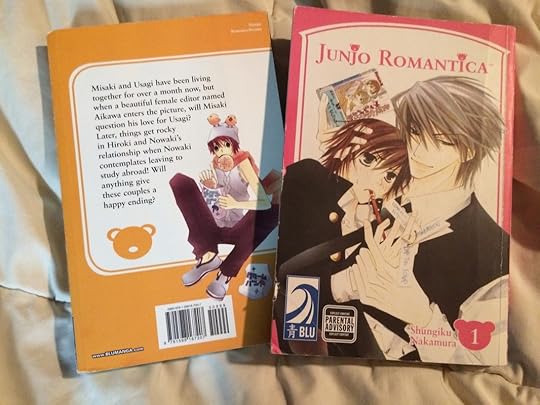 Junjo Romantica was one of the more popular mangas, by Shungiku Nakamura, that the now defunct BLU publishing released. It is an ongoing manga with 18 volumes (and spin offs and animes). We don't have all 18.
Junjo Romantica was one of the more popular mangas, by Shungiku Nakamura, that the now defunct BLU publishing released. It is an ongoing manga with 18 volumes (and spin offs and animes). We don't have all 18.  Masara Minase was a popular mangaka to scanalate. She had some more controversial titles like this one (incest). DramaQueen brought over a few of her titles, and since they are now defunct, the few that were brought over are no longer available. I was/am an avid Anime and manga fan. When I found Yaoi, I ate it up. They turned out one book after another, and then dates got pushed back, titles weren't going to happen. I bought Anime on a regular bases, trust me, I have the shelves filled with the stuff. I WATCHED as companies folded. I saw the genre I read, watched, and enjoyed evaporate. I encouraged people to buy and not read scanalations, or pirated translations on YouTube. But the writing was on the wall. I can't just go out to the store, see a huge selection and just buy what I want now.
Masara Minase was a popular mangaka to scanalate. She had some more controversial titles like this one (incest). DramaQueen brought over a few of her titles, and since they are now defunct, the few that were brought over are no longer available. I was/am an avid Anime and manga fan. When I found Yaoi, I ate it up. They turned out one book after another, and then dates got pushed back, titles weren't going to happen. I bought Anime on a regular bases, trust me, I have the shelves filled with the stuff. I WATCHED as companies folded. I saw the genre I read, watched, and enjoyed evaporate. I encouraged people to buy and not read scanalations, or pirated translations on YouTube. But the writing was on the wall. I can't just go out to the store, see a huge selection and just buy what I want now.Here's a list of publishers that opened and CLOSED during the Yaoi boom: Drama Queen, Be Beautiful, BLU, Broccoli, and Deux Press. (It may not be complete, there are a couple I can't tell if they are defunct now or not). As an example, Drama Queen was founded in 2005 and closed its doors in 2010-2011ish (I think). They lost the rights to a lot of their titles not long after opening their doors and were on extended hiatus for a good portion of that time. BLU was publishing arm of TokyoPop originally started bringing manga to the US in 1997 and eventually went bust by 2011 for a variety of reasons (the Border's bankruptcy did not help).
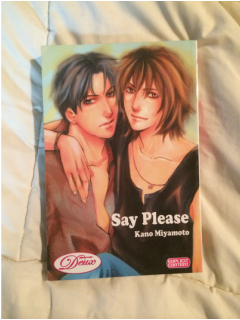 Deux was an arm of Aurora Publishing that closed its doors in 2010. This is, Say Please, a title by Kano Miyamoto.
Deux was an arm of Aurora Publishing that closed its doors in 2010. This is, Say Please, a title by Kano Miyamoto. 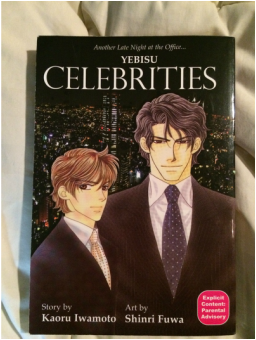 Yebisu Celebrities was published by Be Beautiful, now defunct. The manga has been "rescued" but only in digital format.
Yebisu Celebrities was published by Be Beautiful, now defunct. The manga has been "rescued" but only in digital format.  Another Deux title, Yazuka in Love, this time by the ever amusing Shuiko Kano.
Another Deux title, Yazuka in Love, this time by the ever amusing Shuiko Kano. 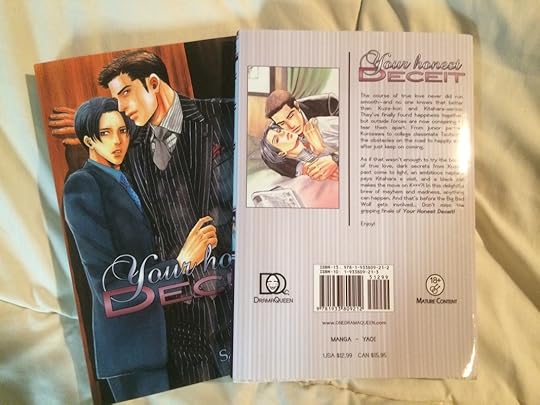 Another Drama Queen title, Your Honest Deceit.
Another Drama Queen title, Your Honest Deceit. 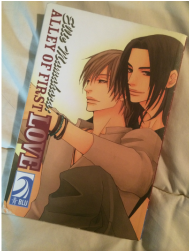 A BLU title, Alley of First Love, a friends to lovers romance. Some are still open, but not many, and they aren't producing what they used to. Just compare what June Manga produced in January of 2008 to January of 2014. In 2008 they were producing six titles a month (you can find it here) and now, in 2014, January had one title (you can find it here), and they don't always have a release anymore.
A BLU title, Alley of First Love, a friends to lovers romance. Some are still open, but not many, and they aren't producing what they used to. Just compare what June Manga produced in January of 2008 to January of 2014. In 2008 they were producing six titles a month (you can find it here) and now, in 2014, January had one title (you can find it here), and they don't always have a release anymore. 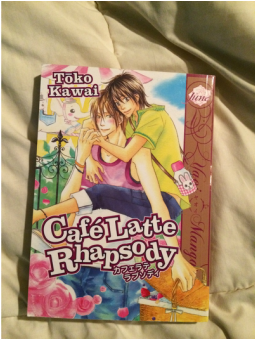 A Toko Kawai title release from the still functioning June Publishing.
A Toko Kawai title release from the still functioning June Publishing. 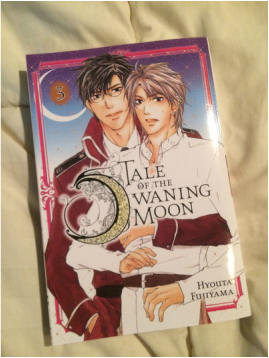 A Hyouta Fujiyama title from the still open Yen Press. Another side effect of the illegal translations was the erosion of trust with US businesses.
A Hyouta Fujiyama title from the still open Yen Press. Another side effect of the illegal translations was the erosion of trust with US businesses. Have new companies and relationships been forged? Yes, I won't deny that. But we aren't getting the same number of Yaoi translations we used to. The Japanese companies are tentative with what rights they do give. Some of the Yaoi companies popping up are forming from non-Japanese artists.
One example is SuBLime Manga (they have excellent PDF files by the way, best I've ever seen – love them). They have worked hard on getting Japanese companies to work with them again. To get the rights of Yaoi titles that were hanging in the wind because the other businesses shut down. But they had to work for each and every title, and the rights to print and digital versions were negotiated separately.
In fact, they had a post thanking fans for the responsibility they've shown with the digital works (you can find it here) because it has allowed them to negotiate new rights with other mangaka and their representatives. But it has taken a lot of effort.
 Crimson Spell was released through Kitty Media, but they are no longer around. This is actually one of the titles rescued by SuBlime.
Crimson Spell was released through Kitty Media, but they are no longer around. This is actually one of the titles rescued by SuBlime. 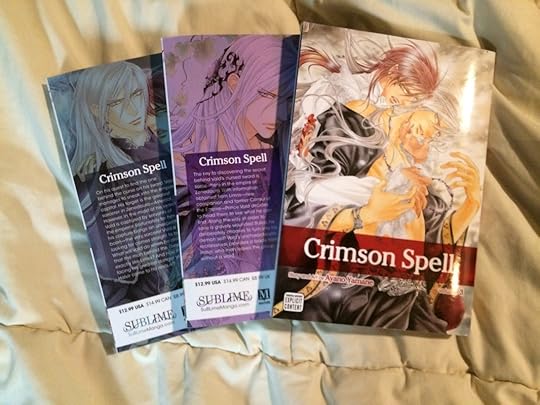 SubLime's Crimson Spell. As you can see, the covers are different, but I'm for one happy to buy the continuation of the series. It was in limbo for so long (not unlike other titles). Japanese businesses and writers don't want to sign over rights to have their works published. And why? They weren't making money. This was their livelihood, how they earned the clothes on their backs, and the food on their table, and instead of giving them a more comfortable existence, what they got was a major headache. Lots of titles are now out of print because of the companies going belly up. Those artists can't resell their rights because a creditor has them. And they are wary of doing more business.
SubLime's Crimson Spell. As you can see, the covers are different, but I'm for one happy to buy the continuation of the series. It was in limbo for so long (not unlike other titles). Japanese businesses and writers don't want to sign over rights to have their works published. And why? They weren't making money. This was their livelihood, how they earned the clothes on their backs, and the food on their table, and instead of giving them a more comfortable existence, what they got was a major headache. Lots of titles are now out of print because of the companies going belly up. Those artists can't resell their rights because a creditor has them. And they are wary of doing more business.SuBLime worked their tail off to get the titles that they have, and they aren't many. It is my hope that readers continue to show them respect by not sharing their translations. Many people watched as the industry fell apart, and many readers mourned the loss, so a lot of those same readers are now protective of the Yaoi that comes over now. We know if we screw it up this time, we get cut off.
And all of this mirrors the debate of translations for English-writing MM authors. If people go around sharing and translating without permission, claiming it’s not hurting anyone, the evidence says otherwise. The sharp decline of Yaoi being brought to the US shows this. If people are saying it's because we're excluding readers, it is not. It's about the resources and ability to be able translate it and the fear of revenue lost to piracy and unpredictable new markets.
Writing takes time. Editing, covers, and marketing all cost the publishers and authors money. If authors can't earn from their writing, then they have to work regular jobs, which means their production goes down, or stops. Just because you can get it on the internet does not equal free. There are a lot of things we can get online that we have to pay for and are willing to do so. If we cannot support the people who create the work that we read, it will go away. I've seen it happen. I don't want to see it happen again. It's not the same when it comes limping back. The selection is smaller and not as diverse or as interesting. Do we really want that to happen here, to us now?
We have an easier way to publish our work in the US, but we are by no means the only ones producing MM Romance. It would be nice to see small pubs overseas reach out to US companies and US companies reach out to foreign companies to work on getting translations, working with each other just like the big pub houses do. But they need the time to allow that to happen. Readers need to give them the time to make those connections because we're new. We're fledglings in this business and haven't had the time to build those connections.
We need to work together, not against each other, if we want to expand our genre farther. Instead of pointing fingers, people finding solutions so we can make the spread of love happen would be more beneficial. Money drives the market, and if that money dries up, so does our market, our chance to have ourselves realized in fiction. It sucks to say something like that, but it doesn't make it less true.
So do I want my books in translation? Hell yeah. And someday, I hope it happens, but first we got to make it so it's possible.
Published on October 03, 2014 17:51
No comments have been added yet.



